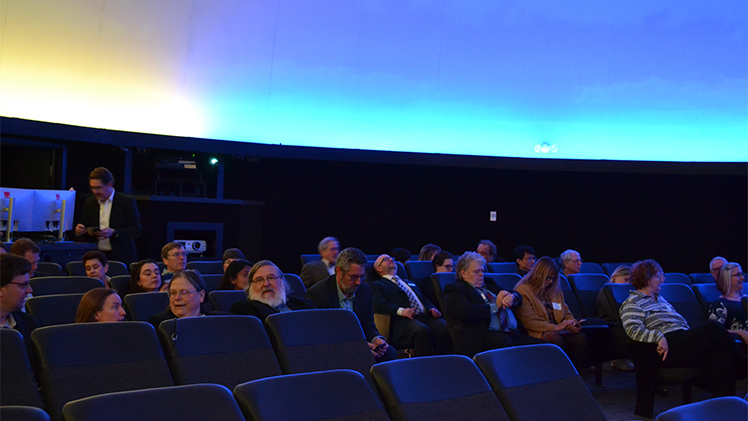The University of Toledo Ritter Planetarium reopens to the public Friday, March 31, after completing the installation of a new, upgraded digital projection system.
The Digistar 7 is a state-of-the-art projection system that provides better quality imagery at 4K and the ability to bring livestreamed events and shows from around the world to the 40-foot domed ceiling.

The University of Toledo Ritter Planetarium reopens to the public Friday, March 31, after completing the installation of a new, upgraded digital projection system.
“Our programs are sharper and more vibrant than ever before because the new projectors have a resolution of 4K and use lasers to generate light,” said Dr. Michael Cushing, a professor of physics and astronomy and director of Ritter Planetarium. “The software controlling everything was also upgraded and so we now have the ability to do things like fly through the rings of Saturn or take a tour of the Pleiades star cluster.”
The first program with the new system is one that has never been shown before at Ritter Planetarium.
“Stars of the Pharaohs,” narrated by the actor John Rhys-Davies, debuts at 7:30 p.m. Friday, March 31, and continues to be featured on Fridays at 7:30 p.m. through April 28.
The program transports you to ancient Egypt 6,000 years ago to see how astronomers made the first solar calendar, aligned their temples and pyramids and told time by the stars. You’ll discover the connection ancient Egyptians felt with the heavens and explore the most spectacular temples and tombs of the ancient world, projected all around you in their original splendor.
Through April, the planetarium also is showing “Zula Patrol: Under the Weather,” a program for children featuring heroes and villains who learn all about weather — here on Earth and on other planets.
The program is featured Saturdays at 1 p.m. from April 1 through April 29.
The program presents heroes of the Zula Patrol, who are on an expedition to collect samples of weather for scientist Multo’s research. When the Zula Patrol inadvertently hurts the feelings of their loyal pet, Gorga, he decides to leave Zula and find another planet to live on. Villain Dark Truder then tricks Gorga into helping with his latest scheme to rule the universe. The Zula Patrollers find out and go after him — in the process learning all about weather, both here on Earth and on the other planets of the solar system.
Admission to the programs is $8 for adults and $6 for children, senior citizens and UToledo community members. Doors will open 30 minutes prior to the show.
The planetarium portion of the program lasts approximately one hour, consisting of both the show and a Q&A session. Weather permitting, the evening shows will be followed by observing at Brooks Observatory atop McMaster Hall to view the stars and planets through UToledo’s Celestron 14 Edge HD telescope.
Ritter Planetarium’s new, $320,000 Digistar 7 system replaces the SciDome XD projector system acquired in 2011. The renovations were made possible by the generosity of a loyal donor.
Ritter Planetarium, which first opened in 1967, closed on Dec. 24, 2022, for the installation of the new system.
The planetarium hosts more than 300 programs each year.
Approximately 5,000 students visit the planetarium every year.
For more information about the spring programs, visit the Ritter Planetarium website.